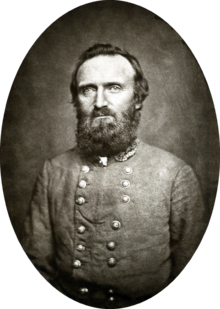Stonewall Jackson | |
|---|---|
 Portrait by Nathaniel Routzahn, 1862 | |
| Birth name | Thomas Jonathan Jackson |
| Nickname(s) |
|
| Born | January 21, 1824[1] Clarksburg, Virginia (now West Virginia), U.S. |
| Died | May 10, 1863 (aged 39) Guinea Station, Virginia |
| Buried | |
| Allegiance |
|
| Service |
|
| Years of service |
|
| Rank | |
| Commands | |
| Battles / wars | See battles
|
| Alma mater | United States Military Academy |
| Spouse(s) | |
| Children | 2 |
| Signature | |
Thomas Jonathan "Stonewall" Jackson (January 21, 1824 – May 10, 1863) was a Confederate general and military officer who served during the American Civil War. He played a prominent role in nearly all military engagements in the eastern theater of the war until his death. Military historians regard him as one of the most gifted tactical commanders in U.S. history.[2]
Born in what was then part of Virginia (now in West Virginia), Jackson received an appointment to the United States Military Academy, graduating in the class of 1846. He served in the United States Army during the Mexican–American War, distinguishing himself at the Battle of Chapultepec. From 1851 to 1861, he taught at the Virginia Military Institute.
When Virginia seceded from the United States in May 1861 after the Battle of Fort Sumter, Jackson joined the Confederate States Army. He distinguished himself commanding a brigade at the First Battle of Bull Run in July, providing crucial reinforcements and beating back a fierce Union assault. Thus Barnard Elliott Bee Jr. compared him to a "stone wall", which became his enduring nickname.[3]
He performed exceptionally well in various campaigns over the next two years. On May 2, 1863, Jackson was accidentally shot by Confederate pickets.[4] He lost his left arm to amputation. Weakened by his wounds, he died of pneumonia eight days later. His death proved a severe setback for the Confederacy. After Jackson's death, his military exploits developed a legendary quality, becoming an important element of the pseudohistorical ideology of the "Lost Cause".[5]
- ^ Eicher, High Commands, p. 316; Robertson, p. 7. The physician, Dr. James McCally, recalls delivering baby Thomas on January 20, 1809, just before midnight, but the family has insisted since then that he was born in the first minutes of January 21. The later date is the one generally acknowledged in biographies.
- ^ James I. Robertson, Stonewall Jackson: The Man, the Soldier, the Legend (1997).
- ^ Hamner, Christopher. "The Possible Path of Barnard Bee." Teachinghistory.org. Accessed July 12, 2011.
- ^ "Stonewall Jackson Timeline". Virginia Military Institute. Retrieved December 11, 2023.
- ^ Wallace Hettle, Inventing Stonewall Jackson: A Civil War Hero in History and Memory (Louisiana State University Press, 2011)